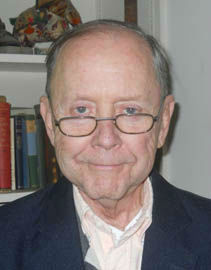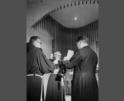
Culture
The beatification will be an occasion for rejoicing not only by Opus Dei's 80,000 members worldwide but by many thousands of others who revere the memory of a man whom his friends knew simply as Don Alvaro.

Shaw
As Pope John Paul II was leaving Opus Dei headquarters in Rome after paying his respects at the wake of Bishop Alvaro del Portillo, someone thanked him for coming. The Pope, a future saint, replied, "Si doveva. Si doveva"--I had to.
It was common knowledge that John Paul didn't usually take time out for events like this. So why "I had to" in the case of Bishop del Portillo, the Prelate of Opus Dei?
Friendship was one--the two men went back a long way--but also the fact that by the time of his death in February, 1994 del Portillo, though scarcely a household name, was known, trusted and respected at the highest levels of the Church.
The incident of the wake supplies the opening for a new biography of Bishop del Portillo issued in time for his September 27 beatification in Madrid. The beatification will be an occasion for rejoicing not only by Opus Dei's 80,000 members worldwide but by many thousands of others who revere the memory of a man whom his friends knew simply as Don Alvaro.
The biography, written by John F. Coverdale and published by Scepter, is called Saxum--Latin for "rock." That was the nickname given del Portillo by the founder of Opus Dei, St. Josemaria Escriva, whom he served loyally as right hand man for nearly 40 years and eventually succeeded. It was a tribute to his steadfastness and reliability.
I visited him a couple of times at his office in the Parioli district of Rome. These were just brief courtesy calls, but even so I was struck by his visible goodness and warmth. "It was like meeting your kindly grandfather," I told someone later.
Alvaro del Portillo was born March 11, 1914 in Madrid, third of eight children in a devout Catholic family. He prepared for a career in engineering but upon meeting the young priest Escriva was attracted to the ideal of holiness in ordinary life promoted by the lay group Escriva had founded. In 1935 del Portillo joined the Work and devoted himself to helping spread its message. He was ordained in 1944, one of the first three priests ordained specifically for Opus Dei.
Starting in the early 1940s, Escriva sent del Portillo to Rome several times to negotiate formal approval of Opus Dei by the Holy See. When Escriva himself moved there in 1946, it became home for del Portillo too.
Rome beyond the Vatican is filled with religious institutions--headquarters of religious orders, convents and monasteries, universities and seminaries, historic basilicas and humble parish churches--all more or less focused on the Holy See and the person of the Pope. This wasn't the place the man who'd meant to be an engineer would have chosen for himself, but it was where providence put him, and in his unassuming way he thrived on it, earning a reputation for discretion and a generous heart.
Before and during the Second Vatican Council, he served as staff or advisor to commissions engaged in planning and then carrying on the work of Vatican II and so made his mark on the great event itself. After Monsignor Escriva's death in June, 1975 he was the obvious choice to succeed him, and when Opus Dei received the status of personal prelature in 1982 he became its first prelate. His old friend John Paul II ordained him a bishop in 1991.
Prelate he was and "Blessed" he soon will be. "Don Alvaro" he will remain to those who loved him.
- Russell Shaw is the author of more than twenty books. He is a consultor of the Pontifical Council for Social Communications and served as communications director for the U.S. Bishops.
Recent articles in the Culture & Events section
-
Building a legacyMichael Reardon
-
Scripture Reflection for Nov. 24, 2024, Solemnity of Our Lord Jesus Christ, King of the UniverseDeacon Greg Kandra
-
Seeds of graceMolly M. Wade
-
The dedication of St. Francis Chapel in the Prudential CenterThomas Lester
-
Honeybees are taking over for canariesDeacon Timothy Donohue


















